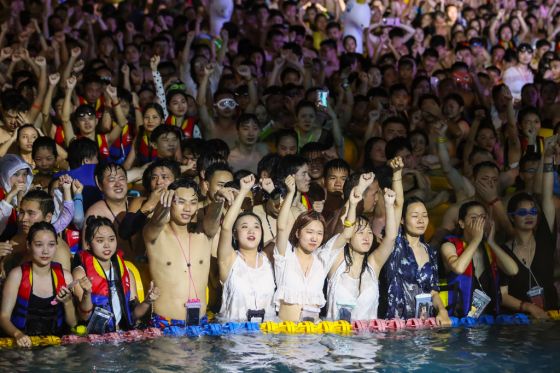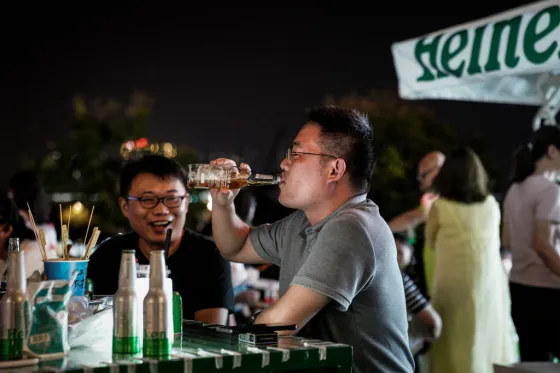New top story from Time: Wuhan Strives to Return to Normal, But Scars From the Pandemic Run Deep
Every year, on Aug. 25, China celebrates the Qixi Festival, the nation’s equivalent of Valentine’s Day. Rooted in a mythical romance between an oxherd and weaver girl, it’s when romance blooms and gooey-eyed sweethearts exchange overpriced trinkets.
In the central city of Wuhan, where the COVID-19 pandemic first erupted in January, couples relished this year’s festivities more than most. Ding Hui, 33, contracted the virus in mid-January and only survived after she was intubated in an Intensive Care Unit. Now fully recovered and back at work at her finance firm, Ding has thrown a party to celebrate Qixi with her husband, friends and colleagues in a penthouse duplex overlooking the Han Jiang River. She says she took eight COVID-19 tests to make sure the virus hasn’t reappeared.
Hearts are painted on the windows; balloons of black, white and gold provide a touch of glamor plus entertainment for her boisterous seven-year-old, Niu Niu. A cake is liberally sprinkled with rose petals. It’s a time for reflection and giving thanks.
“I used to think that it was a normal thing to go home after work and hug my son,” Ding tells TIME. “But when I was seriously ill, it became the most extravagant thing in my life.”
The coronavirus pandemic continues to rampage across every continent with 25 million cases globally. On Thursday, India set a world record for daily infections with 83,883 new cases. Yet in China, where the novel coronavirus was first recorded at a Wuhan wet market, the outbreak is beginning to feel like old news. On Wednesday, the world’s most populous nation reported just 11 new cases, all of them imported.
Read more: Wuhan Doctor Details His Experience Fighting Coronavirus
In Wuhan, a city of 11 million thrust into a draconian lockdown for 76 days from Jan. 23 as officials scrambled to contain the disease, this shift in attitude is thrown into stark relief. When this reporter was last in the city, it was just hours before the lockdown was implemented, and a growing foreboding hung over desolate streets. Upon my return for the Qixi Festival, however, the taxi rank at Hankou Railway Station was swathed in soft rain and the dulcet purr of jazz legend Kenny G. My cab driver didn’t even wear a facemask. Traffic had returned to its usual alternation between snarled and terrifying.
And love was in the air. At Fatty Fatty Crawfish Restaurant, couples gazed into each other’s eyes over steaming piles of desecrated crustacean shells, crimson grease dripping from gloved hands onto plastic tablecloths. Outside, young lovers crammed into karaoke booths and browsed jewelry at teeming night markets, grateful to plan for the future once again.
“In the past, I wanted to divorce my husband every time we quarreled,” says Ding. “But after I was discharged from the hospital, I told my husband that no matter what happened in the future, I would never mention divorce again.”

‘A badly injured child, still slowly recovering’
Yet Wuhan remains a nervy, contradictory place, desperate to banish bad memories that it cannot afford to forget. At her party, between joshing with friends from behind pink comedy sunglasses, Ding makes sure to spray the takeaway food containers with sterilizing ethanol. In the building’s lobby, a vending machine sponsored by U.S. conglomerate 3M sells masks, hand sanitizer, antiseptic wipes and other plague sundries. After a brief resurgence in May, restrictions were reintroduced, and every Wuhan citizen was tested within two weeks.
“Wuhan is a badly injured child, still slowly recovering,” says Ding.
Factory output, retail sales and exports in Wuhan are still markedly down year-on-year. Many shops and businesses have closed, never to reopen. Stimulus measures include 500 million renminbi ($73 million) in shopping vouchers, as well as tax breaks and cash payments to some households. Free-trade zones are being expanded to boost investment.
Ordinary Chinese are also lending a hand. The Number 18 Brewpub, founded by Wuhan native Jiang Qi, was forced to close during lockdown but developed a cult following as beer-lovers across China placed online orders to show solidarity with the embattled city.
“Still, our numbers show that Hubei people buy more of our beer,” confides Jiang proudly. “Loyal customers reflect a quality product.” His three reopened outlets are once again thronged by millennials devouring platters of Bavarian sausages alongside a dozen or so local ales, including a wheat beer, breakfast stout and a cola-flavored variety. Only the sterilization of tables between customers hints at past travails.

But Wuhan’s recovery has also become a propaganda tussle. While President Trump has used racial-tinged phrases like “Wuhan Virus” and “Kung Flu” to describe the pandemic, Chinese officials have seized on the city’s resurgence as vindication of the country’s autocratic political system. (This comes even as some relatives of COVID-19 victims launch legal proceedings against the local government for what they say is its delayed early response.)
Photographs of thousands of young people crammed into a pool party rave in Wuhan went viral in mid-August. Many in the U.S. thought their revelry was insensitive given the spiraling death toll elsewhere. Even liberal firebrands like The Daily Show host Trevor Noah felt aggrieved, saying “It seems a little tasteless to have a pool party in ground zero of a lethal pandemic.”
Read more: Inside Wuhan, the Chinese City at the Center of the Deadly Coronavirus Outbreak
China’s jingoistic state media was unrepentant, naturally, brushing off objections as “sour grapes.” In fact, “If not for the torrential rain seen in June and July, the music and dance festivals would have begun much earlier,” crowed an op-ed in the Communist Party mouthpiece Global Times.
It’s not just official rhetoric. When Olivier Hervet, cofounder of the HdM Art Gallery in Beijing, was invited to a trade show in Wuhan in mid-August, he was eager to show support for the city’s recovery. But upon arrival, the French national says he was met with innuendo and sniping about Europeans’ inferior work ethic compared with the Chinese.
“Local people now display a remarkable sense of bravado after conquering the virus as the West flounders,” he says.
But only time will tell whether there will be more trouble ahead. The source of the outbreak still has not been established, though the working hypothesis is that it leapt from an unknown animal to a human connected to Wuhan’s Huanan Seafood Market, which was known to stock various exotic species. That market remains closed today, but throughout the city TIME saw streetside stalls selling butchered meat alongside live crayfish, eels and huge pulsing bullfrogs. The fear is that confidence bleeds into complacency.
“China is very strong,” shrugs Ding. “I am grateful that I have been in China [during the pandemic]. Had I caught the virus in a different country, I probably would not be alive today.”


No comments